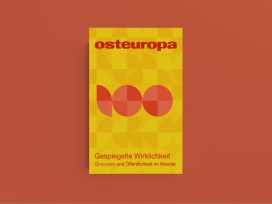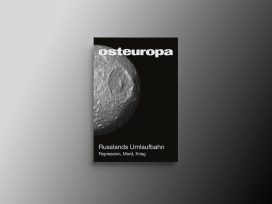Abstracts Osteuropa "The Europe beyond Europe. Outer borders, inner limits"
Karl Schlögel
The European archipelago
The Europe of the Cold War has disintegrated. Instead of two once homogeneous regions – “the East” and “the West” – there are now fragments, enclaves, and islands. For many, they represent a patchwork, but in truth, they are the parts that make up the new Europe. Disintegration is a form of renewal, at least for a moment. There’s more to be said for clinging to the fragments, which are real, than to the whole, which for now is just a promise. Official rhetoric gives in to the latter when it celebrates fragmentation and disintegration as pluralization, as “diversity in unity”. Disintegration is a time of disillusionment and thus enlightenment. That is when those forces appear that have to come into play if something new is to emerge.
Regine Dehnel
Perpetrators, victims, and art. The National Socialists’ campaign of pillage
Between 1933 and 1945, privately and publicly owned works of art, books, and archives were extorted, “aryanized”, “secured”, and robbed, first in Germany, then throughout Europe. Special offices and organizations were involved in this activity. Among the victims of these campaigns of pillage were political opponents: union officials, Socialists, Freemasons, and priests. The Jewish population was hit especially hard. With the attack on Poland and the invasion of the Soviet Union, the peoples of eastern Europe, categorized as “racially inferior”, were plundered. The National Socialist campaigns of pillage for cultural assets are not just a subject of historical research. They continue to hinder the search for mutual understanding within Europe to this day.
Dorothea Redepenning
Ricorda cosa ti hanno fatto in Auschwitz. Music against war and violence
A consensus has been formed in the musical history of Europe as to how sorrow and grief are to be expressed. In the light of the millions of deaths and the extent of the destruction caused by the National Socialist policy of annihilation and the Second World War, western composers have drawn on a different musical language: atonality and serialism. They consider this to be of moral integrity because it was condemned as being “degenerate” under the National Socialist regime. The works of Luigi Dallapiccola, Arnold Schönberg, Karl Amadeus Hartmann, and Luigi Nono, as well as Dmitri Shostakovich, who makes use of other compositional methods, demonstrate how music acts as a memory bank, and how it can become a space for individual, collective, and transnational remembrance.
Georg Vobruba
Expansion without enlargement. Europe’s dynamism and the EU’s Neighbourhood Policy
The EU has developed its European Neighbourhood Policy as an alternative to enlargement. This policy amounts to an offer of a different kind of political deal. The EU is no longer offering the prospect of membership to neighbouring countries; what is now on offer is a special relationship in exchange for their agreeing to carry out stabilization tasks on the periphery. This policy feeds on the EU’s expansion dynamism; however, this dynamism has reached its limits. In its neighbourhood policy, as elsewhere, the EU understands itself as an exporter of values. How successful it will be depends very much on the periphery’s willingness to cooperate. To a greater extent than before, it is important to keep in mind the neighbours’ calculations regarding cooperation and the alternatives open to them.
Arkady Moshes
In search of priorities. The EU, Russia, and their neighbours
The EU has a strategic partnership with Russia, and wishes to maintain privileged relations with neighbouring states to the East. The interests of Russia and the EU are clashing to an increasing extent in this neighbouring space. Moscow sees the EU’s Neighbourhood Policy as an attempt to force Russia out of the region, and reacts allergically to democratization. But it would be a mistake for the EU to reduce its role in this space. Brussels must be prepared to take on more responsibility. The priorities should be democracy and the market economy, not a geopolitical reorientation of the region. In this way, the neighbouring countries could keep up their ties with Russia. And Russia could no longer suggest that the EU was playing a zero-sum game in its policy towards the region.
Kirsten Westphal
Liberalized, monopolized, fixated. Antinomies of the European energy market
The EU defines cooperation on energy policy as a key area of its Neighbourhood Policy. Since 2006, the EU has been trying to extend security of supply, sustainability, and competition as principles of energy policy to the neighbouring space. In doing this, the EU has reoriented its energy policy and geostrategy. However, competition in the energy sector has already come up against the limits set by claims to national sovereignty within the EU. The extension of relations in the sphere of energy policy in the wider region is a long-term but important part of an external energy policy that is coming into being.
Jirí Vykoukal
Fusion or fission? Concepts of central Europe and regional integration
Central Europe sounds full of promise, a promise of cultural diversity and political unity. In reality, it is exactly the opposite. All the political concepts of central Europe developed since the nineteenth century were supposed to serve national goals. Even in times of crisis, they were never really put into practice. By contrast, during the 1980s, the idea that central Europe represented a cultural unity clearly distinct from eastern Europe unleashed a seismic force that shook the Soviet ruling system. Since the latter’s downfall, however, the Visegrád Group has suffered from a lack of cohesion, for regional cooperation cannot be convincingly brought into line with tradition in any of the four states and is thus deprived of historical legitimacy.
Dmitrii Furman
The origins and elements of imitation democracies. Political developments in the post-Soviet space
Russia’s political system is not unique. Throughout the territory of the former Soviet Union, diverse regimes have established themselves behind a democratic façade while concentrating power in the hands of a president. A comparison of the eastern Slavic states with those of Central Asia and the Caucasus shows not only that these imitation democracies have the same source, but that these one-man regimes also draw on the same elements and practices of political rule. Contrary to their purported power and stability, they are dysfunctional in their claims of control, their means of creating legitimacy, and their socio-economic productivity. They all contain the seeds of their own downfall.
Lev Gudkov
Russia’s systemic crisis. Negative mobilization and collective cynicism
Since Putin’s takeover of power, Russia appears to be stronger than it has done for a long time. However, appearances are deceptive. Russia is degenerating into a corrupt police state, society has descended into poverty, and the country is become increasingly isolated. The crisis of legitimacy of the dominant system is reflected in targeted, negative mobilization, which invokes hatred against “the oligarchs”, the United States, NATO, Georgia, and Ukraine. Anxiety about the future, cynicism, images of the enemy, and a diffuse aggression are becoming more commonplace. The need for the security of the collective is growing. Those who identify an enemy and demand that it be destroyed are seen as giving meaning to the situation. However, the political resolve, put on just for show, merely serves to hide the state’s omnipresent incompetence.
Klaus Bachmann
Reason’s cunning. Poland, populism, and involuntary modernization
Poland is unique. Only here does the government consist solely of populist parties. Anybody who tries to analyze it using ideal types from academic research into political parties will fail, because, for historical reasons, the classical fault lines of the party-building process do not exist in Poland. The populists’ success feeds on demographic pressure, the transformation of values, and a deep-seated uncertainty brought on by the reforms at the end of the 1990s. But a comparison with Europe shows: populism in Poland is not unique. It has the same paradoxical consequences: Populists attack democracy, but they make it more stable by expanding its ability to integrate; they make use of anti-modern rhetoric, but by polarizing, they consolidate their opponents and drive modernization forward; and because populists are as a rule incapable of solving problems they have named, they lose voters’ support.
Britta Schmitt
Regulate it, make it taboo, criminalize it. The ethical and religious roots of prostitution policy in Europe
With the fall of the Iron Curtain, trafficking in women from eastern Europe to western Europe and prostitution began to attract greater attention from the public and politicians. Several countries have since changed their prostitution policy. Many have chosen liberalism, others repression. A comparison of Sweden, Poland, Italy, the Netherlands, and Greece shows that different interpretations of the Christian view of human nature, various confessions, and historical developments, as well as the effects of Soviet ideology, shape attitudes towards prostitution and find expression in legislation.
Published 21 August 2007
Original in German
Contributed by Osteuropa © Osteuropa
PDF/PRINTNewsletter
Subscribe to know what’s worth thinking about.



